Do you ever wonder how you got where you are? Have you considered the circumstances and events that brought you to this point in your life?
In his book, Between a Rock and a Hard Place, Aron Ralston recounts the steps and choices he made that led him ultimately, to a life-threatening situation that changed his life. If anything had been different, it could have resulted in an entirely different outcome.
The world we live in has a sense of connectedness that we don’t always notice. But when one thing happens, it always affects something else. Small changes may lead to much larger outcomes.
The Butterfly Effect
In the 1960’s, Meteorologist and Mathematician, Edward Lorenz theorized something he called “The Butterfly Effect”, while studying the way weather is predicted. While challenging the model currently being used, he determined that a small change can lead to vastly different outcomes.
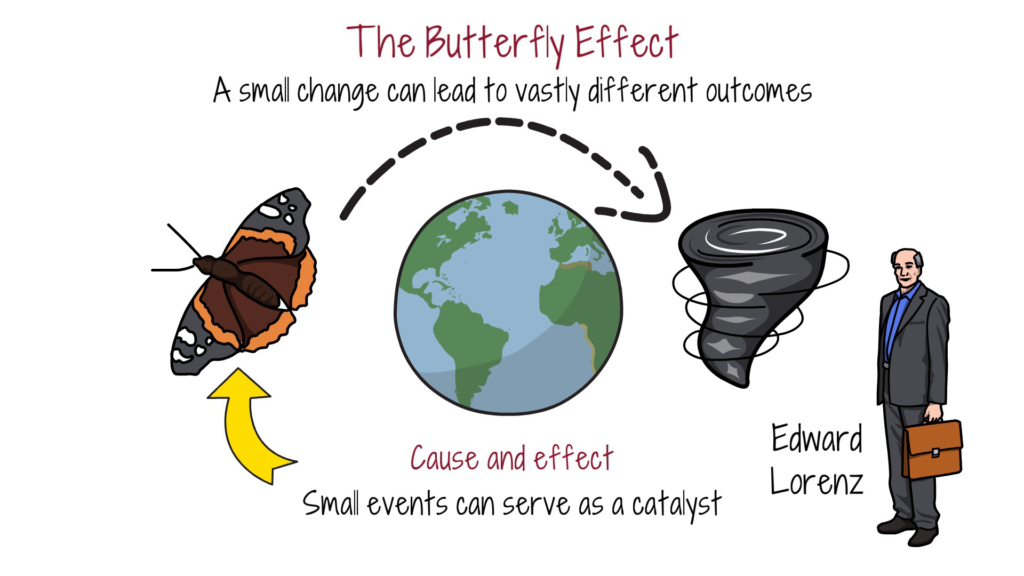
He used a butterfly as a symbolic representation of an unknown quantity or event, and theorized the now familiar term, the butterfly effect, where he stated that the flutter of a butterfly’s wings in one part of the world could eventually cause a tornado somewhere else.
The intention of this symbolic scenario is basically a matter of cause and effect. The idea is that things are interconnected, and small events can serve as a catalyst that act on starting conditions.
The thought of a butterfly fluttering its wings having an effect that could produce a tornado in another place on the planet might be a stretch of the imagination. But the sequence of events that lead from a starting point, to a magnified result can be remarkable!
When you think back on your own life, what events and circumstances have brought you to where you are now? Do you think that if things were different, the results would be the same? Any small change growing up could have produced a huge difference in who you are now, and how your life turned out. Even the people you encountered throughout the years could have been impacted by an interaction with you.
Author Sarah Ban Breaknach wrote,
“You have no idea of the countless lives you touch in the course of your lifetime.”
Small Changes
So, if small changes can make huge ripples that can impact the results over time, what if you wanted to make “intentional” changes? What difference could you make in your life, or in the lives of others, simply by making one small change?
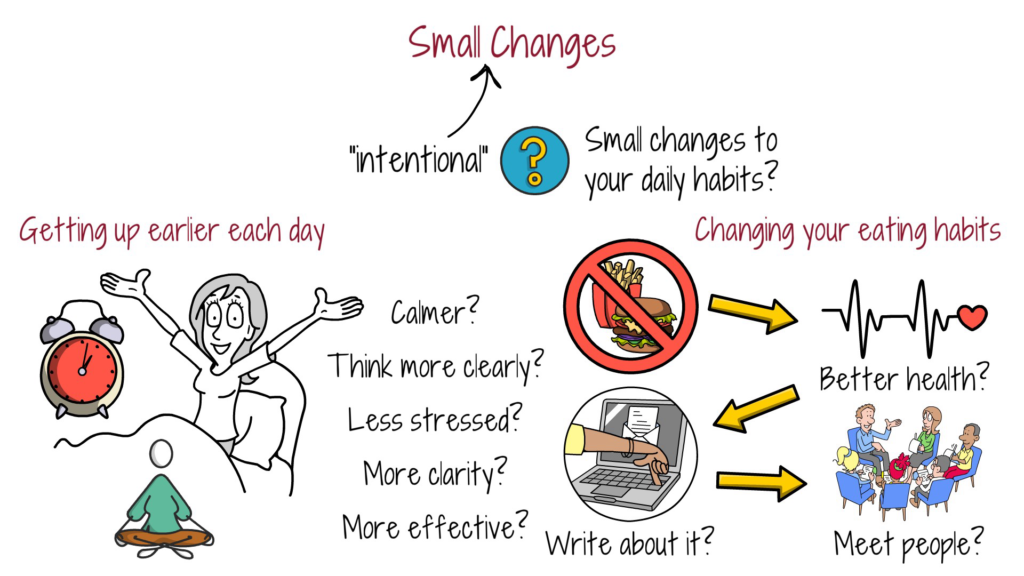
For example, what if you made small changes to some of your daily habits?
- Getting up earlier each day is a small change, but could have a major impact, depending on how you spend that extra time. If you got up 15 minutes earlier each day, and used that time to meditate, what effects might that have on your overall health? Would you be calmer? Would you think more clearly? Then would that affect other parts of your day? Would you feel less stressed in your relationships? Or feel more clarity at work? And if so, would your relationships improve? Could you be more effective at work?
- Or take for example changing your eating habits. Making a decision to eat less processed foods could have a far reaching effect on more than just your daily meal planning. It could lead to a new way of thinking about food, which could lead to better health. You might feel better and get inspired to write about it. Maybe you would meet other people with similar interests. Who knows where one small change in your diet might lead?
Sometimes you may not even know what impact you’ve made. Take for example, the power of actions.
- The power of a smile can have long reaching effects. Just by smiling at a stranger, you might not ever know how that made a difference in that person’s day. And the ripple effect it may have on more people as the day goes on.
Smiling might also have an effect on the way other people respond to you, which could then attract better opportunities and positive interactions. A smile can turn your day around when you’re going through a hard time, and change the subsequent actions that follow.
- Another similar gesture is acts of kindness. If you’ve ever had someone show you sympathy or help when you needed it, you might realize how much of an effect an act of kindness can have.
The butterfly effect can be seen when someone does something nice for someone, and that act of being helpful is repeated again and again. The original kindness may not be related at all to the concurrent acts of kindness that ripple out from the first action. And you may never know how long it may continue to affect others along the way. But the first action acted as a catalyst that sent the energy out into the world like the flap of the butterfly’s wings.
Community volunteering and making a difference in the lives of those around you can be another good example of the butterfly effect. Taking a First Aid/CPR class, helping someone in a Nursing Home, or working at a Soup Kitchen are all changes that you could make in your life, that could make a big difference not only in the lives of those you help, but in your own life as well. Many people have been surprised at the way their lives changed by making one small decision to do something.
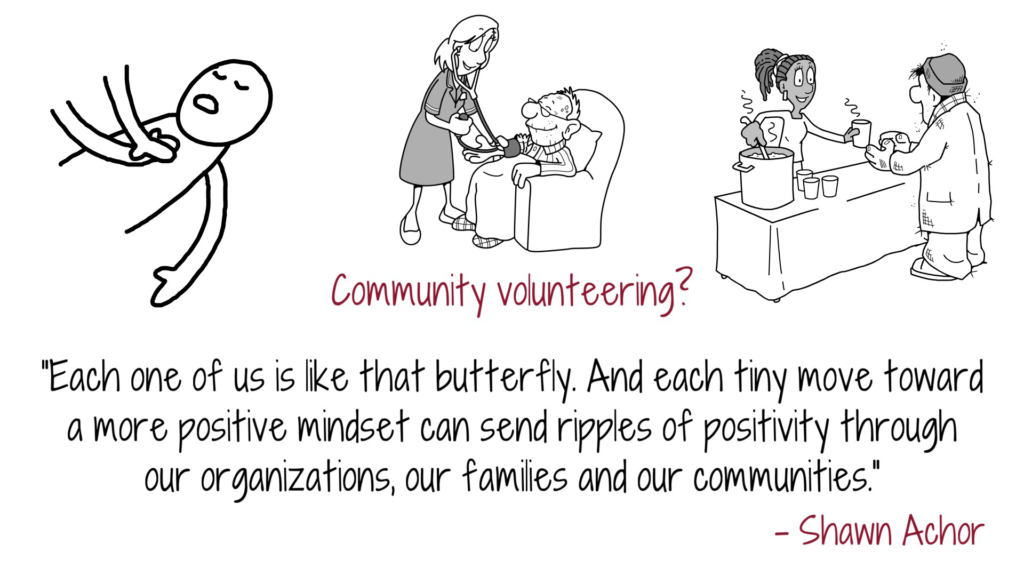
Author Shawn Achor stated,
“Each one of us is like that butterfly. And each tiny move toward a more positive mindset can send ripples of positivity through our organizations, our families and our communities.”
What About The Workplace?
There is literally no part of your life that wouldn’t be impacted by making small changes.
By coming to work earlier, helping a coworker with a project, learning a new skill that makes the job easier or more effective, you might set off a series of events that have productive outcomes.
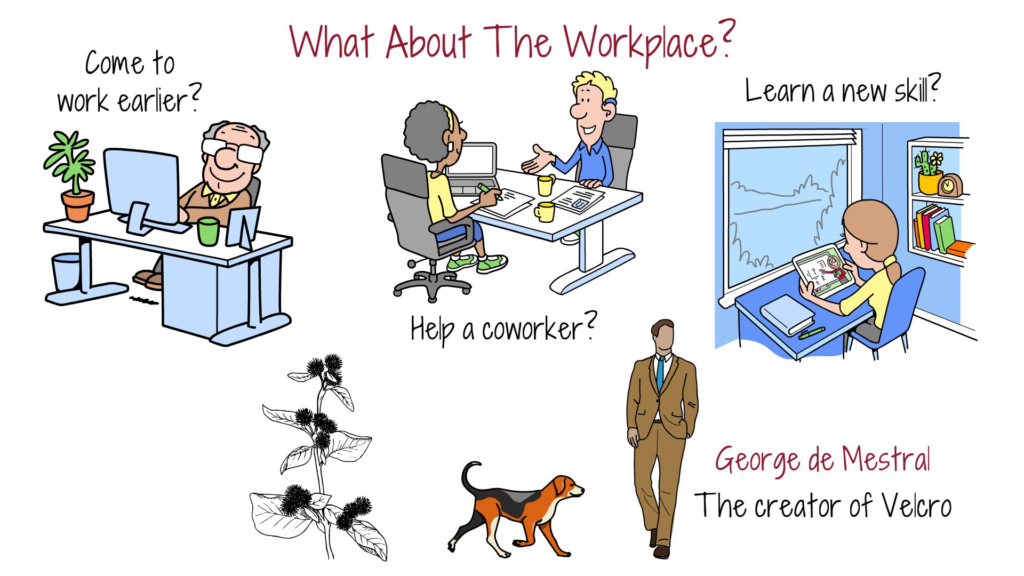
Many Entrepreneurs have had a “Butterfly Moment” that led them to successful careers.
For example, the creator of “Velcro”, George de Mestral noticed burdock burrs that got stuck on his clothes and his dog as he walked through the woods. If he had not walked that way he may never have made that discovery. This one small change in where he walked his dog had long lasting implications over time.
Sometimes the catalyst for change or discovery can be a stroke of luck and timing.
Starbucks CEO Howard Schultz changed a small coffee company into a billion dollar business, from an inspiration he had on a trip to Milan. By observing the way the product was presented and served in the Italian coffee shops, he had ideas to change the way they did business when he got home. By taking that one trip, changes came about that made a huge impact, not only on Starbucks, but on the coffee culture in general.
By making one small change you could find yourself reaping benefits that you never imagined could be possible. You never know what catalyst may occur that will inevitably create an outcome of great magnitude.
The Way You Think
How might things change if you changed the way you believed about something? Great scientists studying the universe caused ripple effects of understanding and knowledge because they changed the way they viewed the science status-quo.
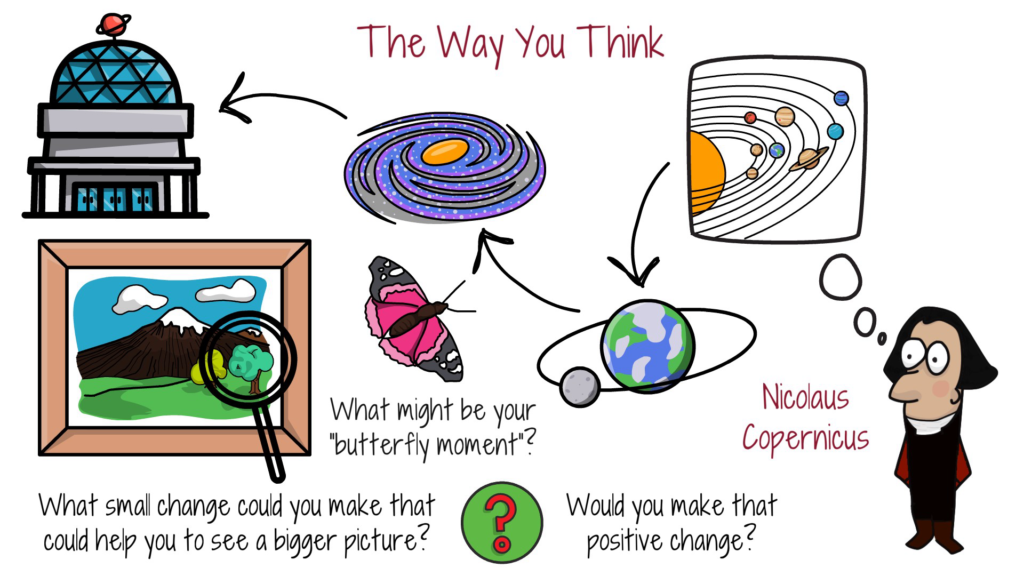
When Astronomer, Nicolaus Copernicus discovered that everything revolved around the Sun, this change in thought brought about a whole new understanding of the Universe, which paved the way for modern astronomy. This one collective change in thinking created huge ripples of new discoveries and perceptions about the reality of our world.
What might change if you opened your mind to other alternative opinions or beliefs? What small change could you make that could help you to see a bigger picture?
Final thoughts
If one thing leads to another, and you could make a difference in the possible outcomes that could unfold, would you make a positive change?
Since small changes can lead to bigger things, what actions might you take to create a better life and a better world? What choices would be the most important to you?
What might be your “butterfly moment”?
